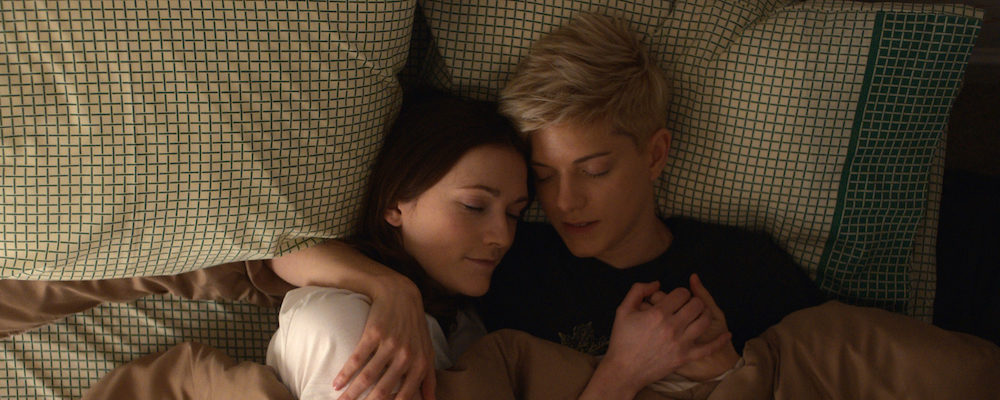Season 2 of Mae Martin’s ‘Feel Good’ Is a Journey of Love and Truth
Alci Rengifo
Trauma can come in many forms. Not everyone with lasting emotional scars has survived a war zone in the literal sense, but many of us have survived inner war zones of the heart and mind. Netflix’s “Feel Good” is about one of those modern wanderers of contemporary life trying to find love and peace, while overcoming searing inner trauma. Mae (Mae Martin) is a queer comedian dealing with PTSD, which makes absolute sense for a show because the best comedy flows out of pain and tragedy. To be truly funny you have to have a real sense of life’s foibles. It makes even more sense that “Feel Good” is semi-autobiographical, with Mae serving as producer and co-writer, because not a single note in the story or performances rings false.
This second and presumably final season is a full continuation of the first, like a biography in motion. Mae has relapsed into drug abuse and is now being driven to rehab by their parents, Linda (Lisa Kudrow) and Malcolm (Adrian Lukis). Of course rehab can’t hold Mae down for long, particularly because their relapse is keenly based on the recent breakup with George (Charlotte Ritchie). While Mae tries to get themselves in order, with the unexpected and maybe unwise help of Scott (John Ross Bowie), George starts a fling with polyamorous bisexual Elliot (Jordan Stephens). But once Mae returns to London and starts acquiring a new agent, they instantly get back together with George. Lest you think that’s a spoiler, it’s simply the beginning of another inner journey for Mae.
The brilliance of “Feel Good” is two-fold. On one level it is one of the best recent LGBTQ dramedies to release anywhere, on another it’s a great dramatic conduit for the moods of a generation grappling with mental health and identity. Mae’s experiences are like constant stops and goes on the way to becoming fully comfortable with themselves. The season begins with Mae still identifying as a she/her, and ends with Mae deciding that they/them is a better fit. It’s not a preachy show attempting to inject woke values into the audience, but instead sharply dramatizes the evolution of our social perceptions and the greater freedom we are discovering by dumping old gender/sexual status quos. There’s casual fun in moments where George tries to get Elliot into kinky role-playing games or group sex, some inspired by Soviet-themed porn she’s discovered online. When Mae interviews with a new agent, the agent automatically assumes Mae must be trans but reassures them it’s perfect for a hip look, describing them as a “lonely millennial.”
There is much real humor in “Feel Good” that’s dark or deadpan. George really indulges in the role-playing kick with Mae, which leads to a hilarious scene where she uses a vibrator while conjuring her own version of “Aliens” when coming back home from work, unaware there’s a surprise birthday party waiting in the living room. The early rehab scenes with Mae are also edgy and funny, with fellow patients who could be refugees from “Orange is the New Black.” This show also knows how to do discomfort well. When Mae has dinner with George’s family, they all roast poor George with a torturous routine about her awful farts. There’s sly jabs at collegial millennial culture, where someone like Elliott looks perturbed by George’s urges and hands her a collection of feminist essays. Mae particularly shines during a standup routine that brings down the house with a bit about hotdogs that goes wonderfully over-the-top. Lisa Kudrow is once again stone-faced brilliance as Mae’s mother, playing the perfect case of a basket of nerves holding herself together.
“Feel Good” originally aired on the UK’s Channel 4 before being picked up by Netflix, where this second season is streaming exclusively. Like many strong British shows, it keeps its format compact. It’s almost a relief that each of its six episodes runs a little under 30 minutes. In an era where most Peak TV offers episodes running from an hour to feature film length, comedy tends to work best in quick, direct strikes. Each episode is a small chapter of Mae’s existence. They seek love but invisible forces hold them back. Some conversations have a piercing insight into the way past moments affect people in ways they don’t realize for a while. In a scene of pure authenticity, Mae shares with George how one of their early relationships was with a 30-year-old, when they were 15. When Mae mentions naively that such an arrangement wouldn’t seem weird to most people, George almost has to take on a parental role to tell them that no, that isn’t right at all. “Feel Good” ends as a unique kind of love story, one that is more mature and sober about what caring for someone truly entails. We are learning to live in a more non-binary world, but accepting someone for who they are means loving the inner turmoil as well. It’s part of what makes us human.
“Feel Good” final season begins streaming June 4 on Netflix.

